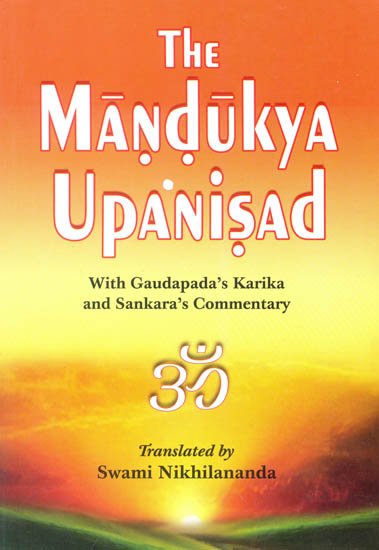Mandukya Upanishad (Gaudapa Karika and Shankara Bhashya)
by Swami Nikhilananda | 1949 | 115,575 words | ISBN-13: 9788175050228
This is verse 3.31 of the Mandukya Karika English translation, including commentaries by Gaudapada (Karika), Shankara (Bhashya) and a glossary by Anandagiri (Tika). Alternate transliteration: Māṇḍūkya-upaniṣad 3.31, Gauḍapāda Kārikā, Śaṅkara Bhāṣya, Ānandagiri Ṭīkā.
Mandukya Karika, verse 3.31
Sanskrit text, IAST transliteration and English translation
मनोदृश्यमिदं द्वैतं यत्किंचित्सचराचरम् ।
मनसो ह्यमनीभावे द्वैतं नैवोपलभ्यते ॥ ३१ ॥manodṛśyamidaṃ dvaitaṃ yatkiṃcitsacarācaram |
manaso hyamanībhāve dvaitaṃ naivopalabhyate || 31 ||31. All these dual objects, comprising everything that is movable and immovable, perceived by the mind (are mind alone). For, duality is never experienced when the mind ceases to act.
Shankara Bhashya (commentary)
It has been said that it is the mind alone which appears as dual (objects) like the appearance of the snake in the rope. But what is its proof? Our answer is this: We make the statement on the strength of an inference following the method of agreement and difference. The proposition is that all this duality perceived as such by the imagination of the mind is, in reality, nothing but the mind. The reason for such inference is that duality is perceived when the mind acts and it vanishes when the mind ceases to act; that is to say, when the (activity, i.e., the Vṛttis of the) mind is withdrawn1 unto itself by the knowledge got through discrimination, repeated practice and renunciation,—like the disappearance of the snake in the rope—or during deep sleep.2 Hence on account of the disappearance of duality it is established that duality is unreal or illusory. That the perception of duality is due to the action of the mind is further proved in this Kārikā.
Anandagiri Tika (glossary)
1 Withdrawn, etc.—This may be called Samādhi. But Vedānta does not prescribe any mechanical method for the attainment of this state. The Vedāntic method for the control of the mind is the discrimination between the real and the unreal (repeated discrimination), all based upon reasoning.
2 Deep sleep—Although there is a difference, Suṣupti has often been pointed out by the Vedāntic Seers as similar to the state of Nirvikalpa Samādhi. Suṣupti is the state when the mind ceases to act. Consequently in it duality is not perceived.
